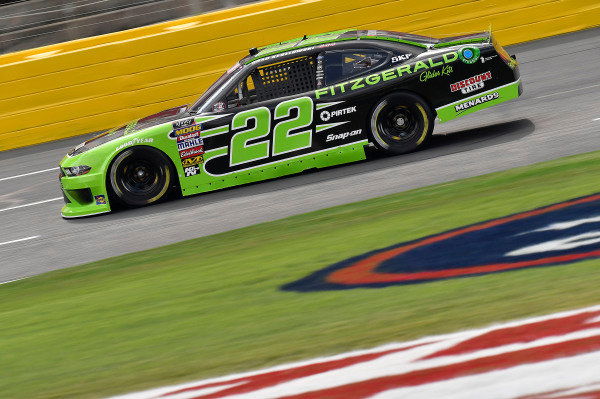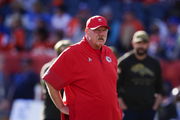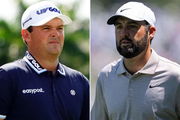
Imago
CHARLOTTE MOTOR SPEEDWAY, UNITED STATES OF AMERICA – MAY 24: #22: Brad Keselowski, Team Penske, Ford Mustang Fitzgerald Glider Kits during the Charlotte at Charlotte Motor Speedway on May 24, 2018 in Charlotte Motor Speedway, United States of America. (Photo by Rusty Jarrett / NKP / LAT Images)

Imago
CHARLOTTE MOTOR SPEEDWAY, UNITED STATES OF AMERICA – MAY 24: #22: Brad Keselowski, Team Penske, Ford Mustang Fitzgerald Glider Kits during the Charlotte at Charlotte Motor Speedway on May 24, 2018 in Charlotte Motor Speedway, United States of America. (Photo by Rusty Jarrett / NKP / LAT Images)
Is one night under the lights at Phoenix Raceway enough to crown a season-long champion? After a shocking behind-the-scenes revelation rocked fans to their core, the question that has plagued NASCAR’s contemporary playoff era returned with a bang. The controversial winner-take-all finale was on the verge of being abandoned by NASCAR’s playoff committee until its television partners blocked the proposal, according to The Teardown podcast.
Watch What’s Trending Now!
It seemed like déjà vu for those who have been following the sport for decades. With nine victories, 1,531 laps led, and a statistical advantage that should have guaranteed him the championship, Kevin Harvick dominated the 2020 regular season. Rather, he was knocked out before the Championship 4 after a mistake at Martinsville. Despite having fewer victories, fewer points, and a less stellar season overall, Chase Elliott came through at the perfect time, prevailed in Phoenix, and emerged victorious. That wasn’t the first time; fans were left wondering if winning a season was still important. Kyle Busch, who returned from injury and a mid-season waiver, won the championship with a single victory in the finals of 2015, despite Harvick leading the field once more with 2,294 laps and 13 runner-up finishes.
Journalist Jeff Gluck, who revealed the information during The Teardown, said that NASCAR’s playoff committee, which consists of competitive staff and internal stakeholders, convened twice in 2024 to reevaluate the present structure. There was a lot of support for doing away with the winner-take-all competition and switching to a system that either prolonged the championship round across several events or rewarded brilliance throughout the entire season. Gluck even estimated that there was a “90 to 95 percent” chance of transformation.
ADVERTISEMENT
When TV partners took over, particularly NBC, which allegedly resisted any alteration to the high-stakes, one-race matchup, that movement collapsed. With NASCAR’s next media agreement worth over $7 billion between NBC, FOX, Amazon, and TNT, the networks have significant control over how championships are selected as well as how races are televised. “TV is in charge of this now,” Gluck said. And in doing so, entertainment value rather than competition continues to determine the sport’s fundamental integrity.
Déjà Vu: Ignorance since 2003 leads to ratings becoming rules in 2025
Online, the criticism was severe and quick. For a lot of people, the research merely supported their 20-year-old belief that the playoff system was always more about the entertainment than the sport. “That doesn’t change that they’re clueless. Yeah, you’ve got people who like the playoffs, they just don’t like the current version. But it’s a ton of people who want a full-season format. Even way back in 2003, people didn’t want the playoffs to begin with. So it’s nothing new.”
ADVERTISEMENT
This is supported by historical polling. According to a 2004 survey of more than 20,000 fans conducted by Jayski.com, 55% of them opposed changing the full-season points system. Only 4.69% of voters supported the playoff scenario that NASCAR finally decided to use. Out of 4,600 respondents, 85% disapproved of the then-proposed “26-10” playoff arrangement, according to another ThatsRacin.com study. These weren’t isolated incidents; rather, they were early warning indicators that NASCAR chose to overlook.
Now, with the current system in its most extreme form, a single race deciding everything, fans are once again speaking with clarity and creativity. “While I’d love a full-season format, I would also settle for a 10-race Chase like we had. Heck, I would probably even be happy with a playoff system that utilized a 3-race final round. One race to decide it all doesn’t make sense in racing.”
ADVERTISEMENT
Top Stories
Scottie Scheffler Faces Scrutiny After Taking Out Anger on Golf Club at WM Phoenix Open: ‘Washed’

Jordan Spieth Throws Bizarre Temper Tantrum as Opening Round at WM Phoenix Open Becomes a Challenge

Rob Gronkowski Demands Severe Punishment for Andy Reid After Bill Belichick Snub

PGA Tour Split Into Two as Scottie Scheffler Confirms Stance on Patrick Reed’s Return

Multiple PGA Tour Pros Stopped from Playing as WM Phoenix Open Round Is Canceled Over Recurring Problem

Drake Maye Reveals Shoulder Injury Update as Patriots QB Announces News On Super Bowl Availability

For many fans, the issue lies not only with the format but also with the people in charge of it. The playoffs have frequently been presented by NASCAR as a new development designed to increase drama and significance toward the end of the season. However, a growing number of fans think the drama is being made up for non-racing-related reasons. “This is what NBC wanted when they came back in 2015. They tried to get IndyCar to implement playoffs, and IndyCar scoffed at them. A network in the 2000s tried to make F1 do a playoff system, and they said no. They must be oblivious to the ratings and see that they go down each year.”
There is a reason for the frustration. Viewership has continuously decreased since the elimination format was implemented in 2014, and the one-race finale idea took center stage. Some playoff races have seen double-digit year-over-year declines, with a 20% drop in important races from 2024 to 2025 being one such instance. Once a year, the high-stakes finish might be thrilling, but supporters argue that it doesn’t merit sacrificing everything else.
“Here’s a novel idea. The TV folks answer to one God. His name is Ratings. Stop watching instead of crying on Twitter. Maybe they’ll listen.” Furthermore, the figures are honest. Just 3.1 million people watched NASCAR’s championship race in 2020, compared to 6.5 million in 2013, the last year of the old points system, according to Sports Media Watch. By 2024, a number of playoff events have seen 18–20% drops in the 18–49-year-old audience, which is exactly where TV executives are expected to succeed.
ADVERTISEMENT
Amid the outrage, some fans are pushing for practical alternative formats that keep the playoff concept alive but fix its core flaws. “If you keep playoffs (which I still think is stupid, but I am somewhat sympathetic to the idea), it needs to be 4 different tracks — 1 short (Martinsville), 1 road course (Roval), 1 intermediate (Phoenix), 1 speedway (Homestead). At least make it a true test.” Others proposed switching to a three-race final round where consistency counts or reintroducing the old 10-race Chase without eliminations. These are well-considered recommendations meant to restore a sense of competitive fairness, not merely sentimental pleas for the past.
Although NASCAR has established a working group of stakeholders to investigate a potential revamp by 2026, the organization has stated that no changes would occur in 2025. Teams, manufacturers, media partners, and drivers are represented in that group. However, supporters are unlikely to stop questioning a format that consistently prioritizes flash over foundation and timing over talent until that shift materializes.
Even drivers who often bite their tongue to stay in the sport’s good graces have been speaking more freely. After his 2020 elimination, Kevin Harvick told NBC Sports, “We shouldn’t have been in that position with the year we had. We did everything right, but it just didn’t matter.” Denny Hamlin, on his Action Detrimental podcast in 2023, made it clear: “One race for a title? That’s not what this sport was built on.” Even the ever-stoic Mark Martin, looking back at the evolution of the format, once said, “It’s not about consistency anymore. It’s about surviving the system.”
ADVERTISEMENT
This isn’t a theoretical disapproval for either drivers or fans. It is based on actual results that keep changing legacies. Few would contend that Joey Logano was the finest of the entire year, but he did peak at the ideal moment when he won crowns in 2018 and 2022. After missing 11 races due to injuries, Kyle Busch won the championship in 2015; he was only able to do so because of a waiver and the reset points system. These instances are significant and would not have been possible under the pre-2004 arrangement, and not merely footnotes.
The fear isn’t just that someone might get lucky. Is it that a season of dominance can now be erased in one afternoon? The championship has become disconnected from the season it supposedly reflects. Whilst a working group comprising teams, drivers, and media partners is considering format changes for 2026, NASCAR has stated that there will be no changes to the playoff structure in 2025. It remains to be seen if that approach leads to actual change. One thing is for sure, though: the clash of voices calling for a solution is only becoming louder. And social media isn’t just for fans anymore. Data analysts, Hall of Famers, former champions, and even TV viewers cast their votes using their devices.
If NASCAR wants to protect the meaning of its championship, it may finally need to ask itself: Who is this format serving, those who race, or those who sell the broadcast?
ADVERTISEMENT
ADVERTISEMENT
ADVERTISEMENT
ADVERTISEMENT